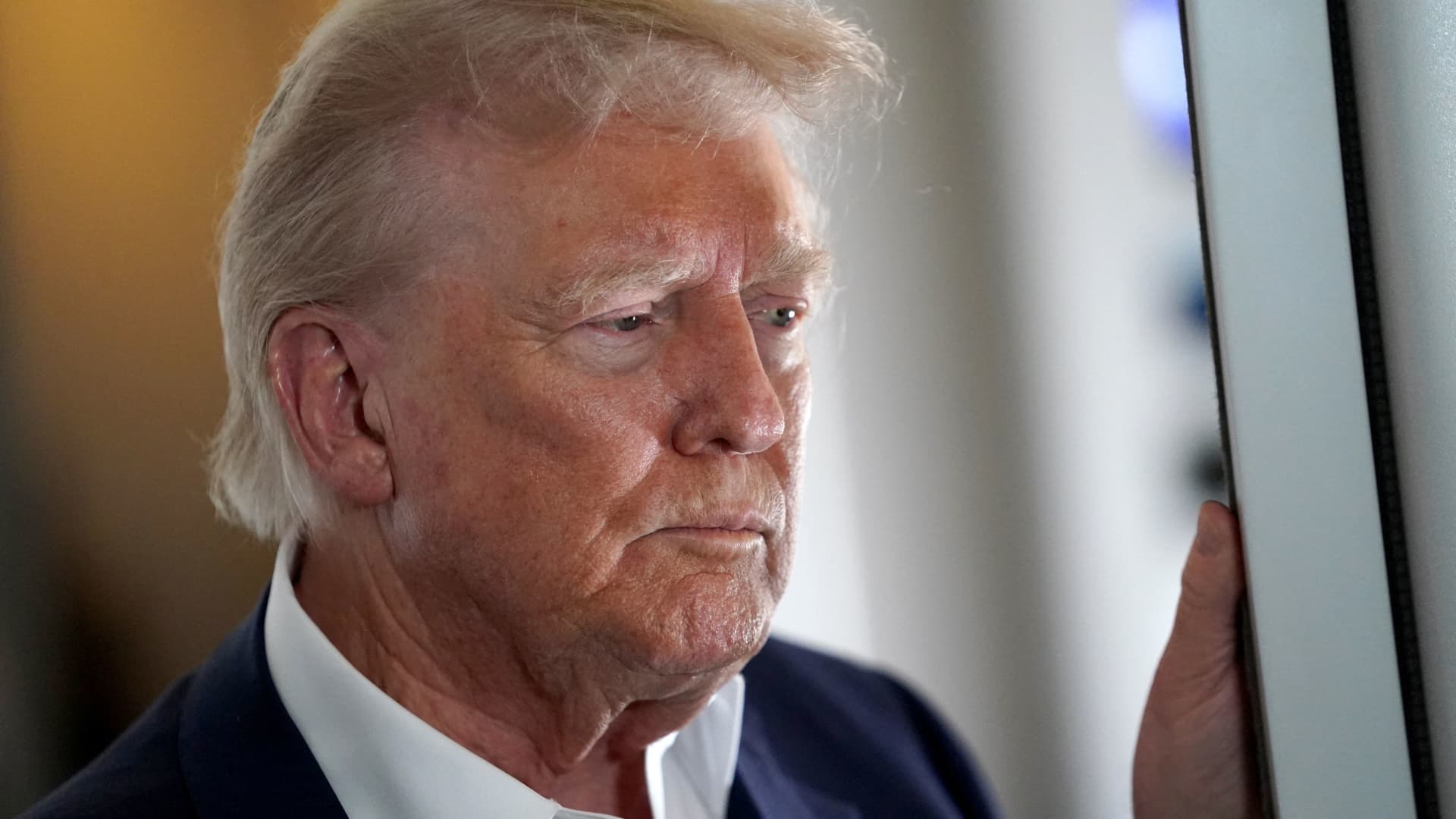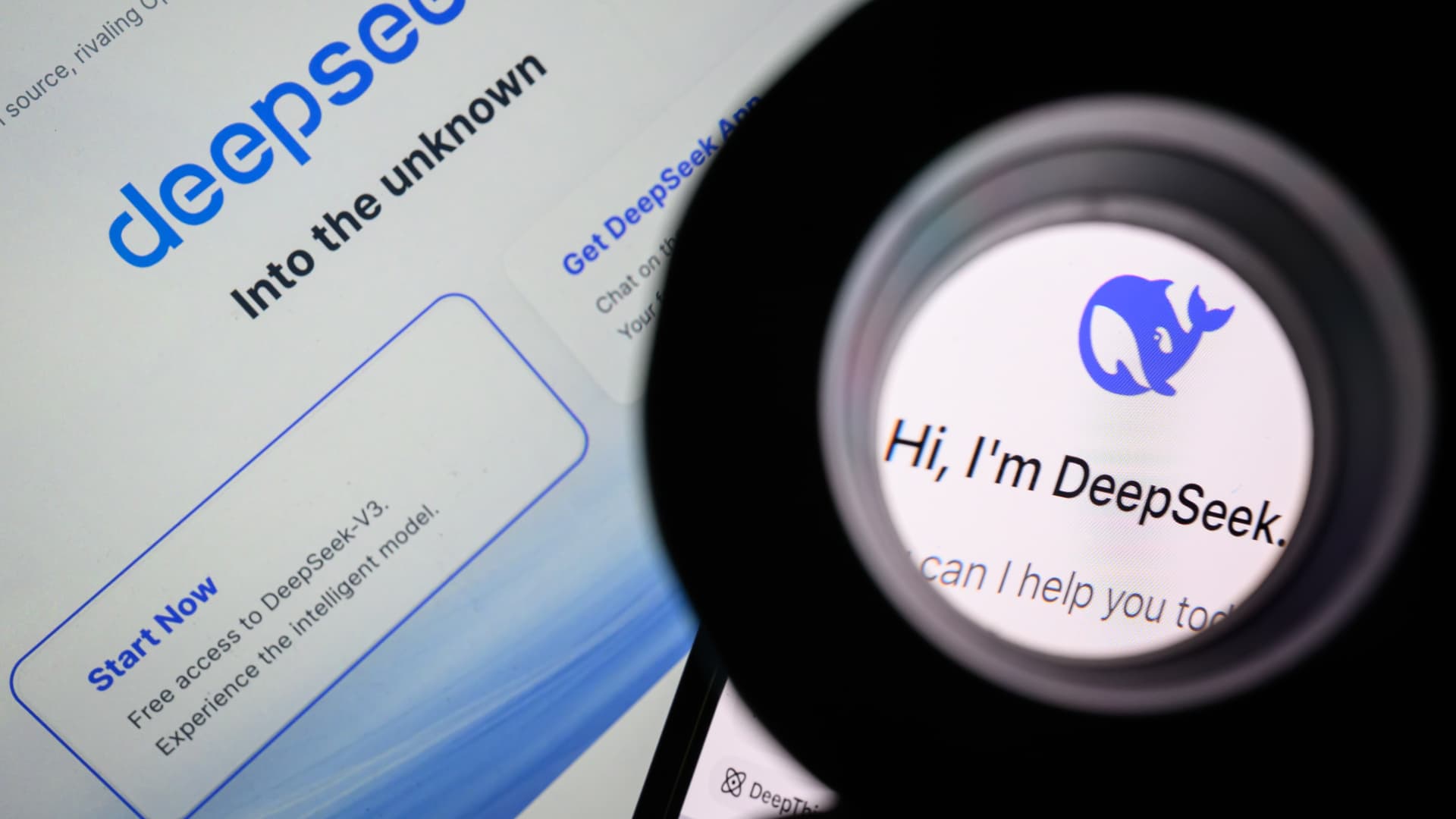U.S President Donald Trump speaks to members of press onboard Air Force One on a flight to Fiumicino Airport near Rome to attend the funeral of Pope Francis, April 25, 2025.
Nathan Howard | Reuters
Before his presidential election win last fall, Donald Trump famously boasted that he could end the war between Russia and Ukraine in “one day.”
During the first tone-setting 100 days of Trump’s second presidency, reaching a ceasefire agreement that’s respected by both sides — let alone a peace deal — has arguably been much harder than the White House leader had anticipated.
Trump has rowed back on his initial comments about bringing a quick end to the three-year conflict.
“Well, I said that figuratively, and I said that as an exaggeration, because to make a point,” Trump told Time magazine last week. “Obviously, people know that when I said that, it was said in jest, but it was also said that [the war] will be ended.”
To be fair to the Trump administration, it didn’t waste time in initiating discussions with Russia, and then with Ukraine, in a bid to broker a ceasefire deal that could lead to peace talks. As yet, there has been no real progress on that score.
Talks are ongoing between the U.S. and teams from Kyiv and Moscow, but Washington threatened last week to quit negotiations if there was no imminent signs of compromise. The warring parties have continued to accuse each other of sabotaging a ceasefire deal and of not respecting a U.S.-brokered agreement to not target their respective energy infrastructure.
‘Very critical’ week ahead
U.S. Secretary of State Marco Rubio said Sunday that the coming week will be “very critical” for the White House as it makes a “determination about whether this [ceasefire talks] is an endeavor that we want to continue to be involved in.”
“There are reasons to be optimistic, but there are reasons to be realistic,” Rubio said, adding: “We’re close, but we’re not close enough.”
Russia and Ukraine continue to trade drone and missile attacks while holding separate talks with the U.S. Kyiv’s hopes to restore its pre-war territorial sovereignty took a hit last week, when the U.S. appeared to side with Russia that Ukraine might have to accept the loss of occupied territory, such as Crimea, as part of a peace deal.
Meanwhile, the Kremlin insists it is serious about a peace deal, with Spokesman Dmitry Peskov telling reporters Monday that while Russia’s war on Ukraine carries on, so do efforts by the U.S. “to bring the process on a peaceful path.”
“The readiness of the Russian side has been repeatedly confirmed by the president [Vladimir Putin], the readiness of the Russian side without any preliminary conditions to begin the negotiation process with Ukraine in order to get on peaceful path. The efforts are continuing. That is all we can say on that,” he said, according to comments translated by NBC News.

Tina Fordham, founder of Fordham Global Foresight, noted that that, while the week ahead was being framed as another “make or break” period for diplomacy on the Russia-Ukraine conflict, she didn’t see grounds for optimism on a resolution to the war.
“It’s easy to start wars, it’s hard to stop them,” she told CNBC’s “Squawk Box Europe” on Monday.
“Both sides will tell President Trump that they want to make peace, because that’s what Trump wants to hear. But it’s to Putin’s advantage to keep the status quo as long as possible,” Fordham noted.
“I think we’re seeing that President Trump is getting very frustrated,” she added. “Remember that he promised peace on day one, and also that he really wants the Nobel Peace Prize. And Vladimir Putin has never been in a hurry to make peace. And the circumstances really play to to Russia’s advantage.”
Wiggle room on territory?
When Trump and Zelenskyy held an impromptu meeting at the Vatican on Saturday, on the sidelines of Pope Francis’ funeral, there was optimism that Ukraine’s leader could have persuaded Trump to not give in to Russian demands for Ukrainian territorial concessions.
Trump certainly seemed more hard-headed toward Putin after the encounter with Zelenskyy, telling the press on Sunday that he expected the Russian president to “stop shooting, sit down and sign a deal” and threatening further sanctions on Moscow.
In this photo provided by the Ukrainian Presidential Press Office, Ukraine’s President Volodymyr Zelenskyy, right, and President Donald Trump, talk as they attend the funeral of Pope Francis in Vatican, Saturday, April 26, 2025.
Ukrainian Presidential Press Office via AP
But Trump also appeared to suggest that Zelenskyy was ready to consider ceding Crimea, which Moscow annexed back in 2014, a as part of a deal — a “red line” the Ukrainian leader had previously refused to cross. When asked by reporters Sunday if he thought the Ukrainian president was ready to give up the peninsula, Trump replied, “I think so, yeah.”
Zelenskyy meanwhile told the BBC Friday that his countries does not “have enough weapons to return control over the Crimean peninsula” and that “a full and unconditional ceasefire opens up the possibility to discuss everything.”
For Russia’s part, the Kremlin said on Saturday that Putin was ready for direct negotiations with Ukraine without preconditions. European diplomats remain skeptical.
Kaja Kallas, the European Union’s foreign policy chief, told CNBC on Monday that Russia has not shown it wants peace, given its attacks on civilian infrastructure in Ukraine in recent weeks. Russia has denied such hostilities against civilian targets in the war, despite multiple strikes.
“We know here very well that Ukraine wants peace and it take two to want peace, it only takes one to want war and we see that Russia does not want peace,” Kallas told CNBC’s Silvia Amaro.
“Russia is the one that is bombing civilians and civilian infrastructure whereas Ukraine has agreed to an unconditional ceasefire over a month ago. So what we need to see is more pressure on Russia so that Russia will also want peace,” she said, adding that the bloc’s position on Crimea’s future was unambiguous.
“International law is very clear: Crimea is Ukraine, and I think if Crimea is given away, then the outcome is that it will just embolden aggressors, because it pays off to change the borders by force,” she said.
Oleksiy Goncharenko, an independent Ukrainian lawmaker, said Monday that “the only obstacle to peace is Russia and Putin, because he doesn’t want peace. We Ukrainians, we want peace as soon as possible.”
Yet, he agreed that there could be room for maneuver when it comes to a ceasefire being reached while Russia still occupies Ukrainian land.

“Ukraine will never recognize any inch of our territory as Russian, but the hostilities can end with an actual control of Russians of part of our territories, which will be illegally occupied. Unfortunately, this will not be the first case in the world’s history, and probably not the last,” he told CNBC’s “Europe Early Edition” on Monday.
“One day, the Russian Empire will fall apart like it happened before, and we will take them [the territories] back. But for the moment, we can’t kick the Russians out from our territories. But once again, we will never recognize them as Russian. And that should be absolutely clear,” he said.




